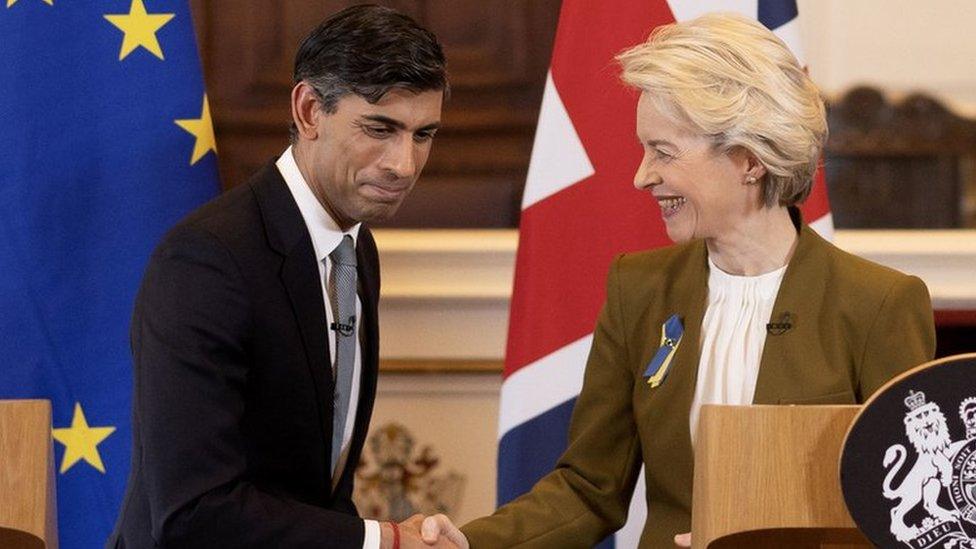NI politics 2024: Strikes, elections and a Stormont deal?
- Published
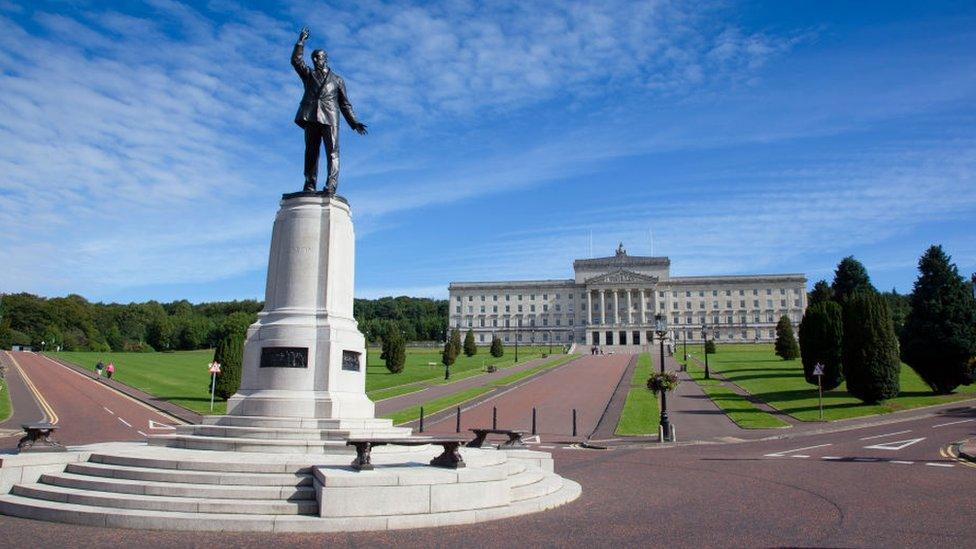
Stormont has been without a devolved government for almost two years
Although Northern Ireland had no power-sharing government throughout 2023, there were still plenty of memorable political moments.
And 2024 looks set to have many more twists and turns for Stormont politics.
Will the Democratic Unionist Party (DUP) end its devolution boycott? Or could the stalemate continue until voters head to the polls in a Westminster election?
Here is a look at the key areas to watch out for during 2024.
Deal or no deal for DUP?
In February, it will be two years since the DUP brought down Stormont's power-sharing executive.
The party has been protesting against post-Brexit trade checks between Northern Ireland and Great Britain.
It believes the arrangements under the Northern Ireland Protocol diminish the region's place within the UK internal market.
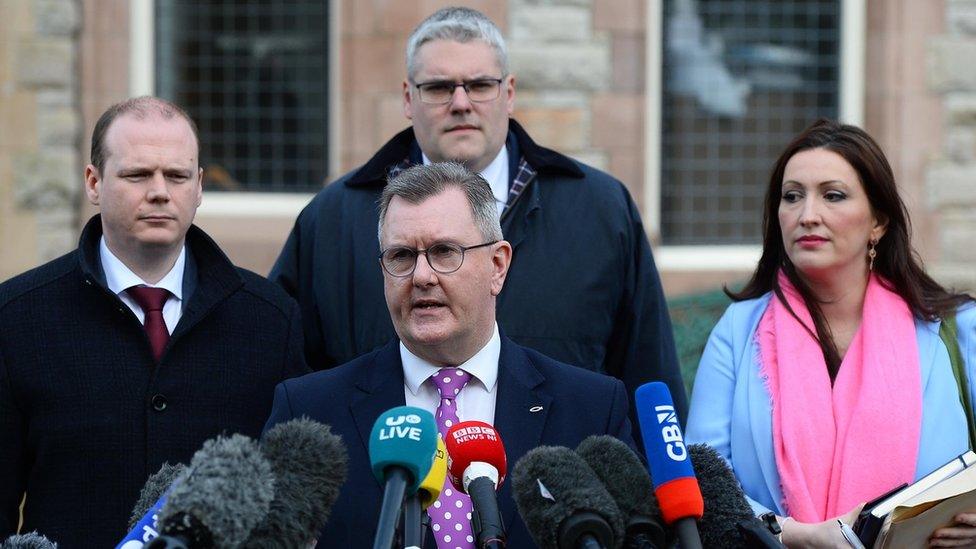
DUP leader Sir Jeffrey Donaldson (centre) has a decision to make
A new deal called the Windsor Framework was agreed in 2023 between the UK government and European Union aimed at addressing concerns with the protocol.
The DUP said this did not go far enough, and for months the party has been in talks with the government seeking further changes.
In December, the Northern Ireland secretary said those talks had "effectively concluded".
Chris Heaton-Harris also offered a £3.3bn financial package for Northern Ireland, dependent upon a restoration of Stormont's devolved institutions.
He said it was "time for [the DUP] to take some decisions".
But DUP leader Sir Jeffrey Donaldson denied that talks had concluded and said there would be a "further series of meetings" shortly after Christmas.
Public sector strikes
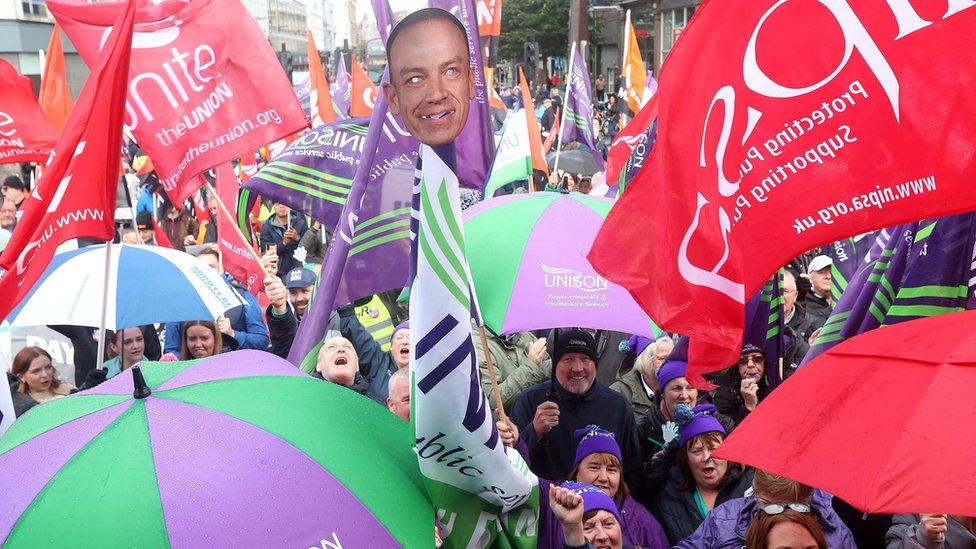
Many unions are directing their frustration over their members' pay towards Northern Ireland Secretary Chris Heaton-Harris
On 18 January, thousands of public sector workers - including civil servants, health and education staff - will go on strike in Northern Ireland over pay and conditions.
Trade union Nipsa said the strike would be "the biggest ever seen" in Northern Ireland.
Mr Heaton-Harris has come under pressure to tackle the dispute in the absence of a Stormont executive.
But he argued it was a matter for local ministers, offering £584m to settle pay claims as part of the £3.3bn financial package if Stormont returned.
The strike may also increase pressure on the DUP to end its block on power-sharing.
Sir Jeffrey said the government's current offer was not a "sound basis" and did not include "the recurrent aspect of that public sector pay award" for the next Stormont budget.
Elections, elections, elections
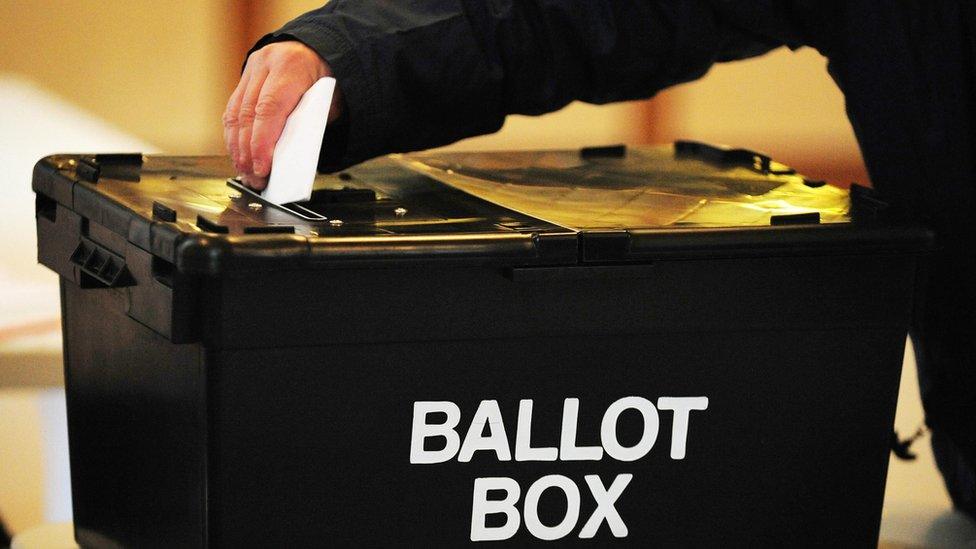
Northern Ireland's MPs will be preparing for an expected General Election this year
The strike coincides with the legislative deadline for re-establishing Stormont's power-sharing government.
If no executive is formed by 18 January, the Northern Ireland secretary falls under a legal duty to call an early assembly election.
But Mr Heaton-Harris has pushed back this deadline several times via emergency legislation.
He indicated he may do so again, saying in a new year's message that he was "not treating this date as a target".
Instead of an assembly poll, Stormont parties will already be preparing for a Westminster election which is expected to happen at some point in 2024.
Politicians in Northern Ireland will also no doubt be paying close attention to polls in neighbouring jurisdictions - and across the pond.
These include voters in the Republic of Ireland taking part in local council and European Parliament elections in June, while the US presidential election takes place in November.
A Sinn Féin first minister?
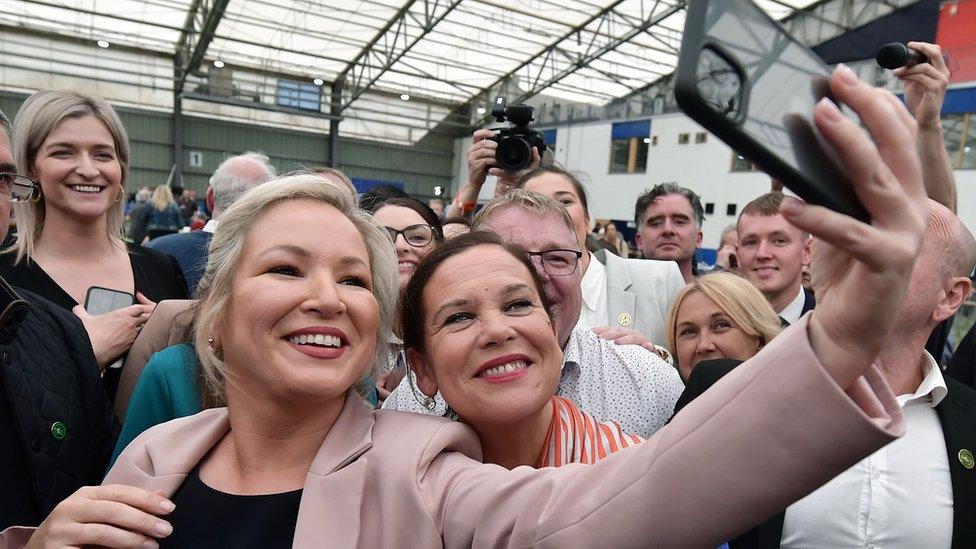
Sinn Féin won the most seats in the most recent Northern Ireland Assembly election in May 2022
If the DUP returns to Stormont power-sharing, Sinn Féin vice-president Michelle O'Neill is set to hold the role of first minister.
It will be the first time an Irish nationalist has held the position in the Northern Ireland Executive.
Sinn Féin won the most seats in the 2022 assembly election, entitling it to the post for the first time.
But the Irish republican party cannot take up the role without the DUP, the largest unionist party, nominating to the role of deputy first minister.
Despite the different names, the first and deputy first ministers have the same powers and responsibilities.
And because of their joint nature, one cannot be in post without the other.
'Plan B'?
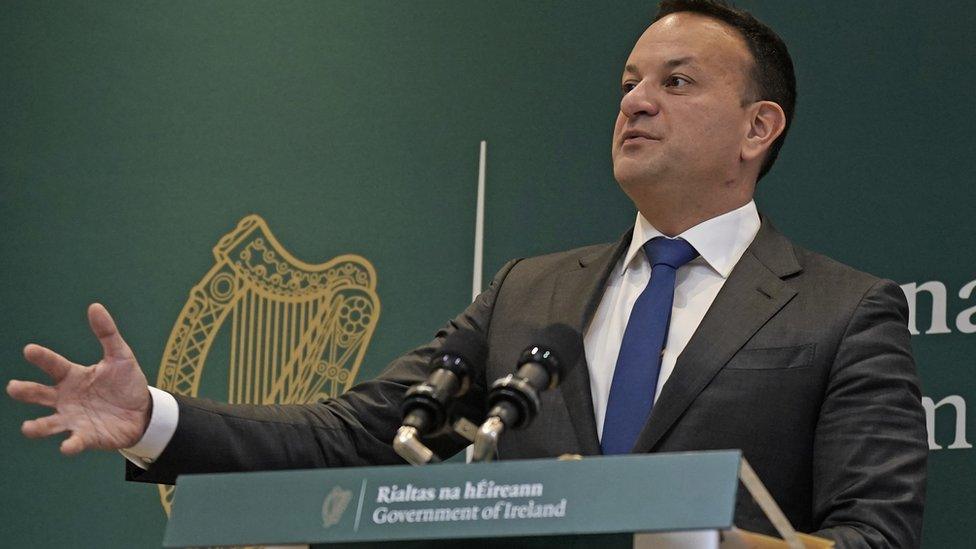
Leo Varadkar began to talk about his support for an alternative arrangement for Stormont in August 2023
If there is no return of devolved government this year, for some it will raise the question: What is the alternative?
Taoiseach (Irish Prime Minister) Leo Varadkar has previously called for a "plan B" if the Stormont institutions were not restored.
Last year Mr Heaton-Harris set a budget for Stormont in the absence of local ministers, leaving unelected civil servants faced with making substantial cuts.
These spending pressures could be eased by the government's £3.3bn financial package proposed last month.
But the money is only being offered if Stormont power-sharing is restored.
Mr Heaton-Harris said the government would "not just stand by" and allow public services to decline, but there "must be a limit to how far the UK government can go without an executive in place".
In a new year's message, he said the government would support Stormont civil servants in "stabilising public finances and services via a sustainable budget" if an executive was not restored.
Troubles legacy act
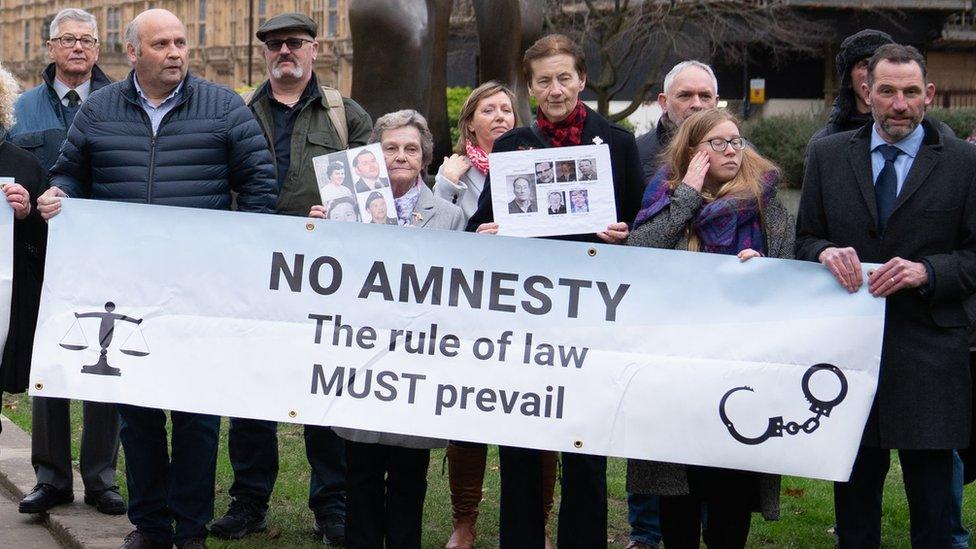
Victims of the Troubles held several protests against the legacy bill before it became law in September 2023
The fall-out over the UK government's controversial Troubles legacy act is set to continue into 2024.
The legislation, which became law in September, offers a conditional amnesty to those accused of killings during the decades-long conflict in Northern Ireland.
It will also stop any new Troubles-era court cases and inquests being held.
In December, the Irish government said it would challenge the legislation in Strasbourg under the European Convention on Human Rights.
Victims and survivors have also taken legal action at Belfast's High Court in opposition to the legislation.
Critics have argued the law removes access to justice, but the UK government has contended it is an attempt to draw a line under the events of the past.
- Published30 December 2023

- Published26 December 2023
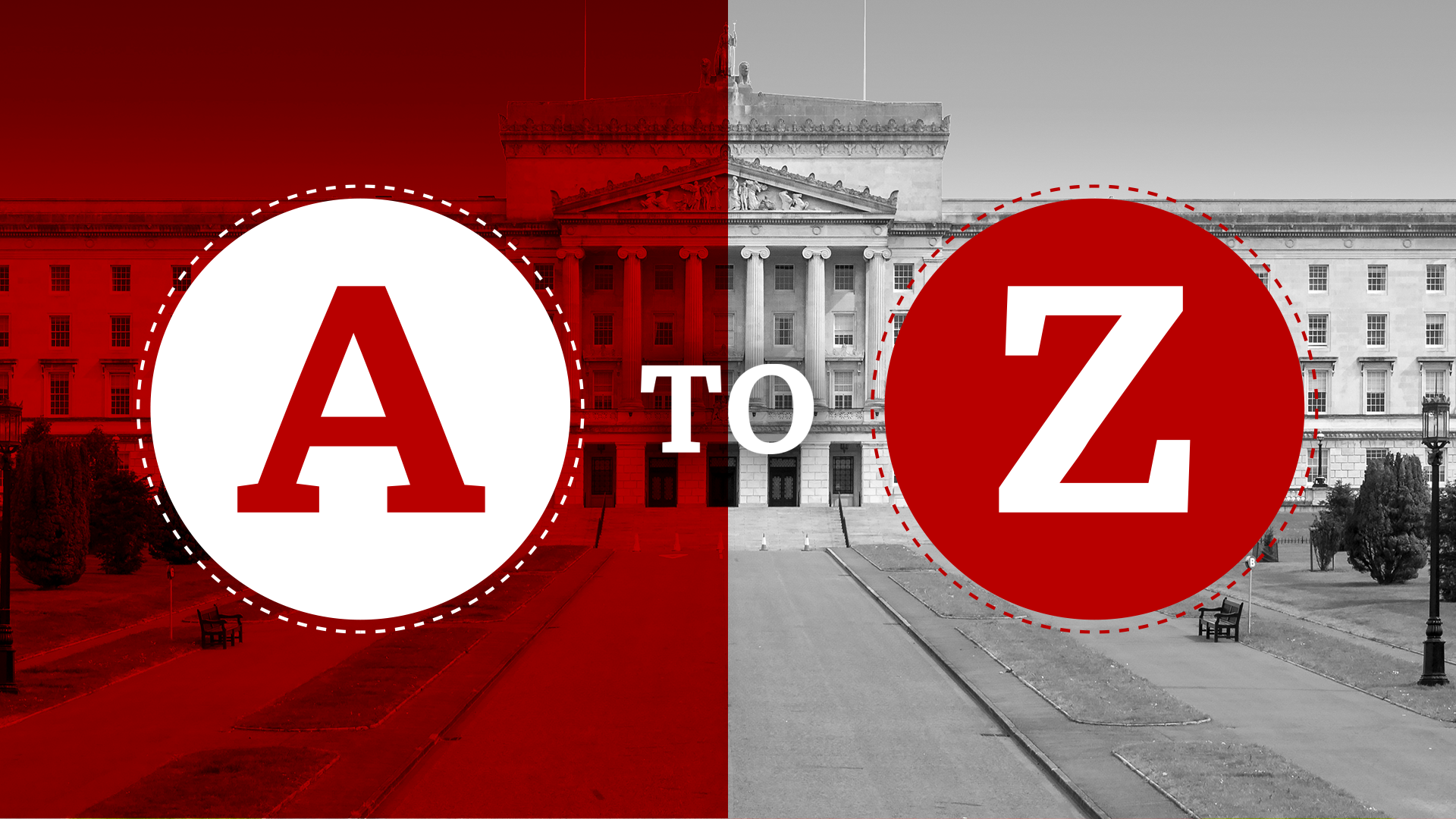
- Published21 December 2023
